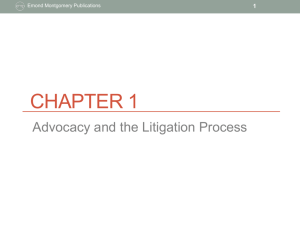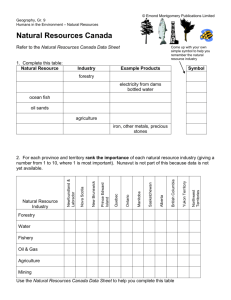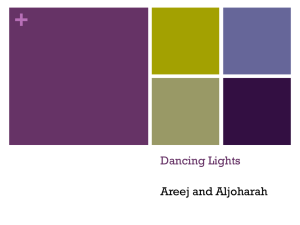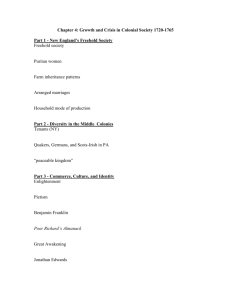Chapter 5
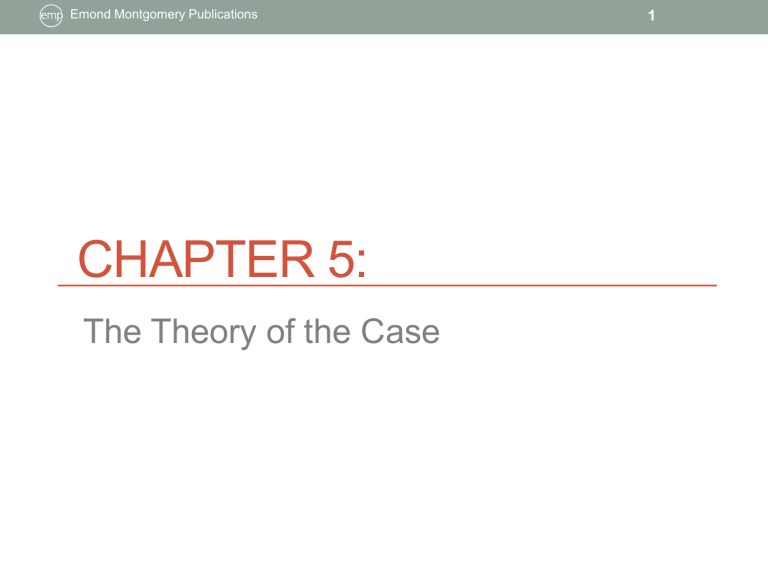
Emond Montgomery Publications
CHAPTER 5:
The Theory of the Case
1
Emond Montgomery Publications
Theory of the Case:
What It Is and Why You Need One
2
• Your theory of the case: a view of the facts and law that can justify a favorable decision for your client
• Include all the facts of the case that are not in dispute and your version of facts that are in dispute
• Facts must constitute a valid cause of action or a valid defence
• Your theory of the case must apply the relevant law to the facts of your case
Emond Montgomery Publications 3
6 Steps to Develop Your Theory of the Case
1.
2.
3.
4.
5.
6.
Gather the Facts : objective facts are the most valuable
Identify the Legal Issues : determine the area of law involved
Find the Relevant Law : substantive law defines the elements of a civil cause of action or the elements of a criminal offence as well as any available defences
Put Relevant Facts into Evidence : what evidence is required to prove each fact? How will evidence be produced at a trial or hearing?
Assess Your Case : identify strengths and weaknesses of your theory
Assess Your Opponent’s Case : anticipate your opponent’s theory of the case
Emond Montgomery Publications 4
5 Stages to an Effective Witness Interview
1.
Preparing
• Review the pleadings in the case
• Familiarize yourself with the legal issues
• Read over statements from other witnesses or your client
2.
Listening
• Show you are paying attention
• Paraphrase feelings
• Paraphrase/summarize content
• Clarify
Emond Montgomery Publications 5
5 Stages to an Effective Witness Interview
(cont’d)
3.
Questioning
• Obtain more details, background information, explanations
• Clarify ambiguities/contradictions in the story
• Determine the relevance of aspects of the story
• Confirm witness’s qualifications by testing their competence to testify , credibility , and bias
• Use different types of questions:
• Open-ended questions
• Narrow questions
• Yes/No questions
• Leading questions
Emond Montgomery Publications 6
5 Stages to an Effective Witness Interview
(cont’d)
4.
Concluding
• Get the witness’s contact information
• Thank the witness for participating
5.
Creating a Witness Statement/Note-Taking
• Take notes as you conduct the interview
• When you are finished, organize the witness’s story and set it out in a witness statement
Emond Montgomery Publications 7
Baldwin Brothers Witness Statements
• Alec Baldwin :
• The Feys discussed a kitchen renovation including installing pot lights
• Tina Fey was told pot lights are $250 ea. and that the Feys would need only 5
• If Tina Fey wanted, more could be installed, but 5 would be enough
• $7,500 was agreed to and the $2,500 deposit was paid
• The job was finished within a week; the Feys seemed happy
• The bill was $8,250: $7,500 + $750 for 3 extra pot lights
• Stephen Baldwin :
• Alec negotiated a contract with the Feys to renovate their kitchen
• When pot lights were installed, Mr Fey asked for 3 extra lights
• Money wasn’t discussed; the Feys seemed happy with the work
• They asked about the extra $750 on the bill
• They said the contract covered “all necessary lights” and wouldn’t pay more than $7,500; we received a cheque for $5,000
Emond Montgomery Publications 8
Theory of the Plaintiff’s Case
1.
Gather the Facts of the case
• After interviews: plaintiff’s advocate prepares a summary of the facts
2.
Identify the Legal Issues Raised by the Facts
• Whether the Feys breached the contract
• Whether the contract price included 5 pot lights or “all necessary lights”
3.
Research and Find the Relevant Law
• Common-law principles of contract law apply
• The courts interpret contracts based on the words they use
• Each party must persuade the court that his or her interpretation of the contract is the correct one
Emond Montgomery Publications 9
Theory of the Plaintiff’s Case (cont’d)
4.
How Will You Put the Relevant Facts into Evidence
• no documents: the contract was oral
•
•
Alec’s testimony
Stephen’s testimony
5.
Assess Your Own Case
6.
• Alec will give evidence that the contract provided for 5 pot lights only
•
•
Unlikely for a contractor to agree to provide an undefined number of lights
If “all necessary lights” were agreed on, the plaintiff maintains that 5 lights were all that was necessary
Assess Your Opponent’s Case
• The defendants could persuade the judge to accept their version of the terms of the contract, and that eight pot lights were necessary to make the kitchen bright
Emond Montgomery Publications 10
Feys’ Witness Statements
• Tina’s Statement:
• I met with Alec Baldwin about renovating my kitchen
• I told him I wanted to replace the existing lighting with pot lights
• He said: pot lights cost $250 ea., he’d install the necessary number (5) of lights as part of the contract price; if we needed more they’d install more
• I paid the ($2,500); they finished within a week; the work was great
• We got a bill for $8,250, instead of $7,500; Mr. Fey dealt with the bill
• Tommy’s Statement:
•
•
Mrs. Fey negotiated a contract with the Baldwin Brothers
I asked for 3 more pot lights to provide enough light; we didn’t discuss money; the work was great
• The bill was $8,250; I asked about the extra $750 and was told it covered 3 extra pot lights
• All lighting was included in the original price; I paid $5,000
Emond Montgomery Publications 11
Theory of the Defendants’ Case
1.
Gather the Facts of the Case
• After interviews: defendants’ advocate prepares a summary of facts
2.
Identify the Legal Issues Raised by the Facts
• Whether the defendants are contractually obligated to pay $750 above the original contract price
• Whether the contract price included 5 pot lights or “all necessary lights”
3.
Research and Find the Relevant Law
• Common-law principles of contract law apply to this case
• There is a contract between the parties. This is an issue of interpretation
Emond Montgomery Publications 12
Theory of the Defendants’ Case
(cont’d)
4.
How Will You Put the Relevant Facts into Evidence
•
•
• no documents: the contract was oral
Tina’s testimony
Tommy’s testimony
5.
6.
•
•
•
Assess Your Own Case
Tina will give evidence that the contract provided for “all necessary lights”
•
•
Alec merely suggested that 5 would be enough
The main concern was the kitchen’s brightness, not the number of lights
Assess Your Opponent’s Case
A judge may accept Alec’s version: it is unlikely that a contractor would agree to provide an undefined number of lights.
If it is decided that the contract was for “all necessary lights,” the judge may not be persuaded that 8 lights were necessary
